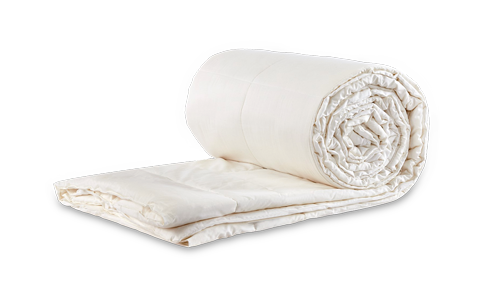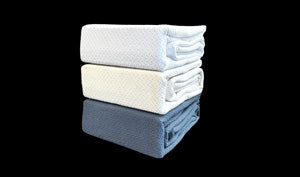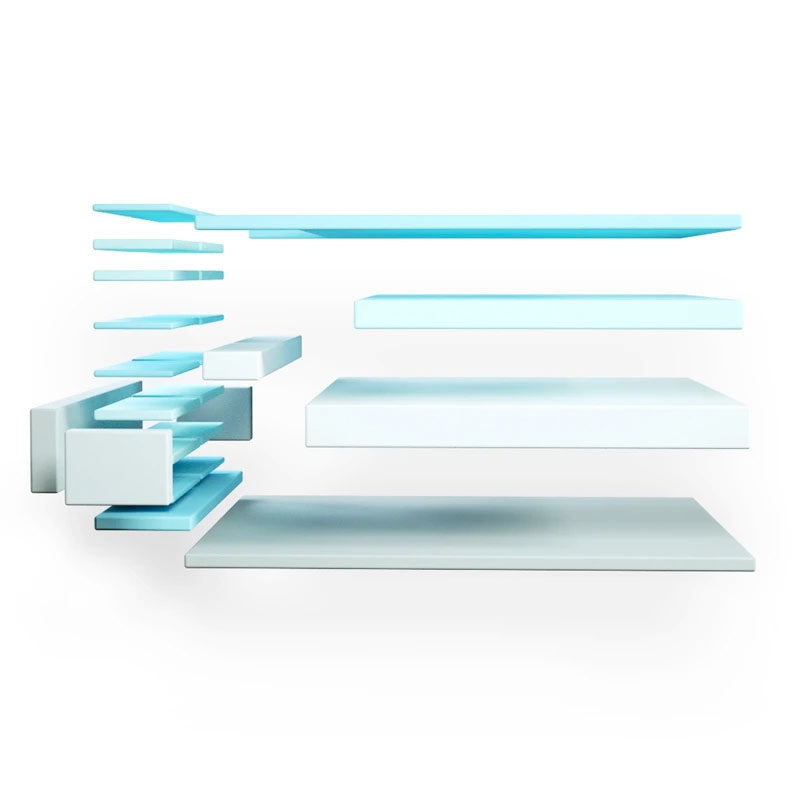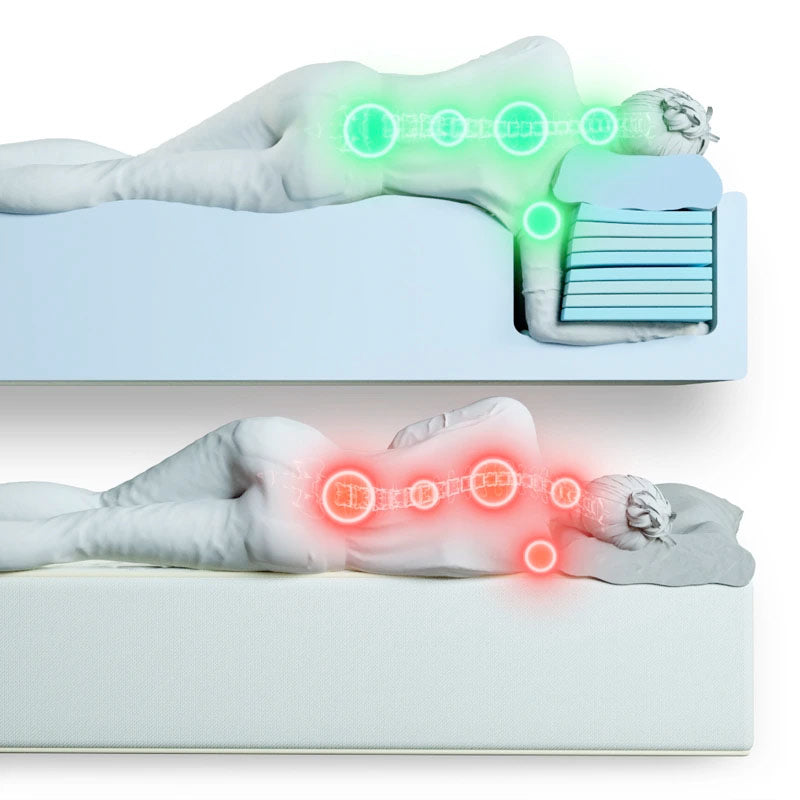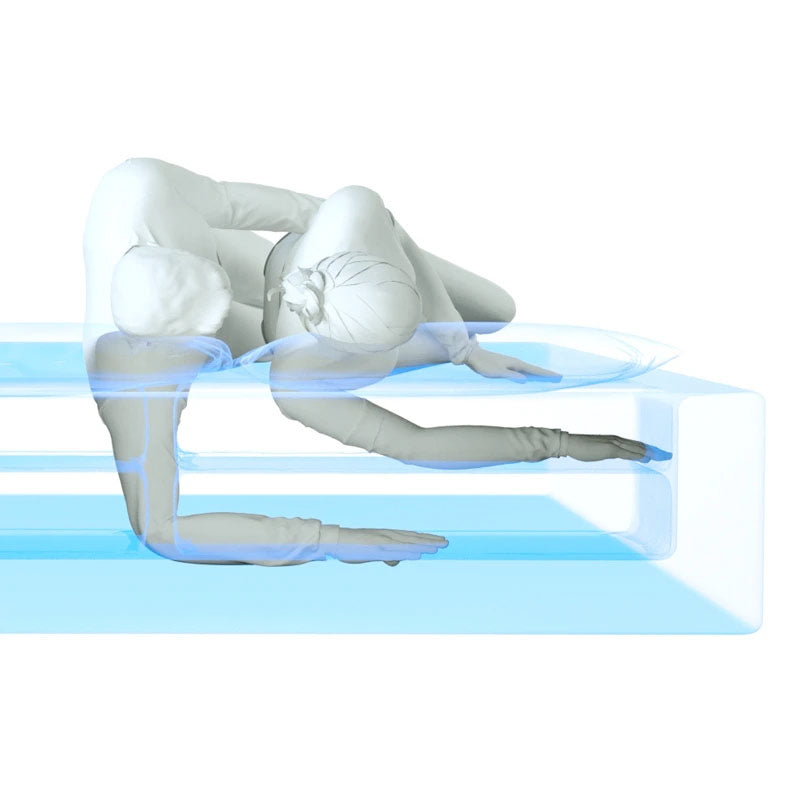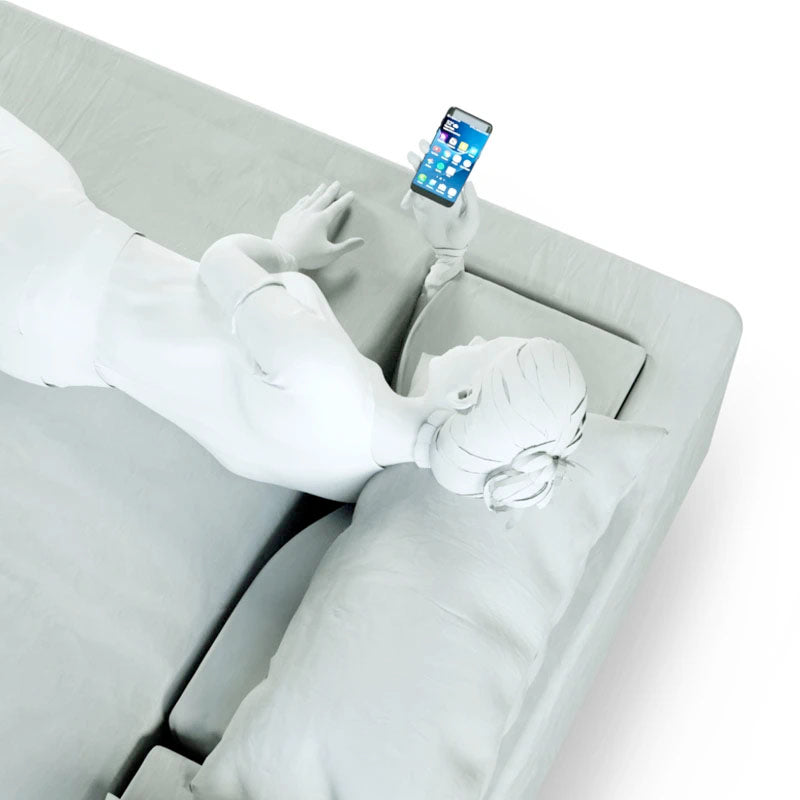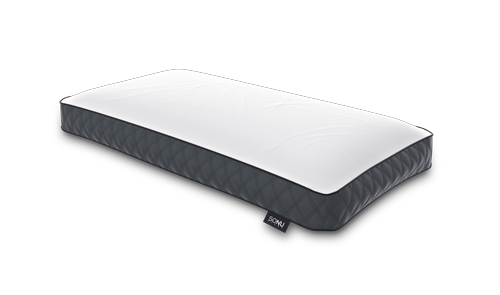Taking care of your heart is integral to maintaining good health. Diet, exercise, and sleep all decrease your risk for heart attack and other heart disorders. No matter your age, it’s never too early or too late to begin your journey to a healthy heart.
When you lie down in your favorite sleeping position, you probably don’t consider the benefits that it could have for your health. However, every position has some advantages. For instance, sleeping on your stomach can prevent you from snoring, and sleeping on your side is great for sleep apnea.
When it comes to heart health, side sleeping is usually best. Unbeknownst to many, what you sleep on and which side you sleep on matters. Which side is it, you ask? It depends on your condition.
Before you decide which side to sleep on, make sure you have the right bed waiting for you at home. SONU Sleep has created the only mattress on the market designed specifically for side sleepers — we’ll touch on this more later on.
How Can Sleeping on My Left Side Help?
Heartburn
If you have heartburn or gastroesophageal reflux disease (GERD), sleeping on your left side may be the best sleeping position. Heartburn occurs when contents from your stomach, like stomach acid, travel up your esophagus. This usually occurs if your lower esophageal sphincter (LES) has become weak.
You can quell your heartburn symptoms by sleeping on your left side. This alleviates pressure from your stomach, allowing its contents to digest normally.
If you’re wondering why sleeping on your right doesn’t deliver the same results, it’s because sleeping on that side can worsen your heartburn or nighttime acid reflux symptoms.
If you can’t sleep on your side for pain reasons, you can sleep with your head elevated to reduce your heartburn symptoms and enjoy a good night’s sleep.
Pregnancy
For pregnant women, sleeping on your left side can improve blood flow to your heart and other organs, like your kidneys and uterus. This sleeping posture will help blood flow to your uterus as well, which benefits your fetus.
The SONU Sleep System was created by side sleepers, for side sleepers.
This mattress features an innovative Comfort Channel, allowing you to immerse your arm and shoulder into the bed itself while sleeping on your side. This immersion helps prevent pain and pressure in your arm and shoulder while you sleep, allowing you to wake up feeling refreshed.
How Can Sleeping on My Right Side Help?
Heart Failure
If you have experienced or are at risk for congestive heart failure, it’s best that you sleep on your right side. Sleeping on your left may cause further discomfort.
Sleep Apnea
Few people may know that having sleep apnea can lead to heart issues. Arrhythmia, hypertension, and heart failure are three conditions that can be caused by sleep apnea. Experts recommend sleeping on your right side to prevent these risks and open up your airways while sleeping.
If you are a side sleeper for the sake of your health but often find that you wake up in pain, the SONU Sleep System will certainly help. Made specifically with side sleepers, the SONU mattress helps relieve pain and pressure with sink-in support, a plush top layer of serene foam, and the patented Comfort Channel.
How Does Sleep Benefit Your Heart?
We all know that maintaining healthy eating, getting enough exercise, stressing less, and having regular checkups with your doctor are essential for heart health. Getting enough sleep is equally important as any of those things.
Ideally, we should aim for seven hours of sleep per night. A lot of people simply are not doing that, which puts their hearts at risk. Between 50 million and 70 million adults in the United States have sleep issues.
If you frequently do not get enough sleep, you put yourself at risk for high cholesterol and high blood pressure. Here are some more issues you’re at risk for, which affect your heart.
Heart Disease
As mentioned, people with sleep apnea are at risk for heart issues. Insomnia can lead to coronary artery disease and plaque buildup. And that’s not all.
Neurological sleep disorders can increase your risk of heart disease. And if you have type 1 narcolepsy, your blood pressure will remain stagnant when you sleep instead of lowering it. This is also a risk for developing heart disease.
Heart Attack
If you sleep for short periods or oversleep, you could be at risk for a heart attack.
Stroke
Similarly, not getting enough sleep or getting too much can put you at risk for a stroke. It could even lead to your death. Plaque in the blood vessels and blood clots can lead to a stroke, and the clots can cause blood flow to stop pumping to the heart.
Obesity
People who don’t sleep enough often struggle with their weight. Consuming more fatty foods and not getting enough sleep inevitably put your heart at risk.
Inflammation
Although researchers are not entirely clear how inflammation can lead to a heart attack, there is a connection. Many heart attack patients are found to have inflammation. Specifically, they show a fatty buildup in their blood vessels.
Diabetes
People with type 2 diabetes could eventually suffer from a heart attack. This is because the high blood sugar levels from type 2 diabetes cause triglycerides and cholesterol to increase, which can damage blood vessels.
Not getting enough sleep can lead to any of these conditions. If you have experienced any of them, talk to your doctor to create a recovery plan for your health. The last thing you want to do is damage your heart.
What Are Other Beneficial Sleeping Positions?
If you are not able to sleep on your side, there are a few other positions you can explore that provide health benefits. No matter what sleeping position you opt for, the SONU Sleep System can help you enjoy a better night’s rest.
The SONU mattress features a plush top layer of serene foam that offers sink-in support and cooling technology. The mattress itself is made from a combination of top-quality foams, working to help reduce motion transfer, align your spine, and help you achieve an unforgettable sleep experience.
Back Sleeping
Sleeping on your back might help if you experience neck pain, spine issues, or lower back pain. (Some experts recommend side sleep for these conditions.) If the pain is in your lower back, adding a lumbar pillow can help. You can even put a pillow under your knees to remove pressure from your lower body, like your hips.
If you’re concerned about wrinkles, sleeping on your back is best. In other positions, your face is pressed against a pillow, creating creases in your face that are noticeable the next day. Over time, these creases can cause wrinkles to develop.
If you experience nasal congestion, sleeping on your back with your head elevated allows you to breathe easier. It will help keep your nostrils open and allow your nose to drain if need be.
Stomach Sleeping
Sleeping on the stomach is the least popular position. However, it does have at least one benefit. Stomach sleeping is good for snorers because it opens their airways when they sleep.
How Else Can I Protect My Heart?
We’ve mentioned diet a lot in this article because it is a key component of heart health. Maybe you want to eat healthy but don’t know where to start. Or maybe you’re already a healthy eater, but want to discover other options. Either way, here are the foods you should eat to have a healthy heart.
Fruits & Vegetables
Fruits and vegetables are great for preventing cardiovascular disease. They’re excellent sources of vitamins and minerals, and some are even high in fiber.
Not all fruit and vegetables are created equal. When selecting which to eat for heart health, go with the following:
- Apples
- Assorted berries
- Carrots
- Broccoli
- Kale
- Tomatoes
- Bell peppers
- Brussel sprouts
- Garlic
- Onions
Healthy Fats
Yes, there is such a thing as healthy fats. Eating them is good for preventing coronary artery disease and lowering your blood pressure. Eating healthy fats lowers your risk for heart attack.
Wondering which healthy fats to buy? Here are a few:
- Avocados
- Olive oil
- Vegetable oil
- Nuts
- Seeds
- Canola oil
Protein
Protein works wonders. It can help keep you alert during the workday and fill you up when you need to eat something light. Low-fat proteins, in particular, are an excellent food group for your heart.
These are the best proteins for your heart:
- Eggs
- Fish
- Skim or low-fat milk
- Cheese
- Yogurt
- Skinless chicken
- Soy
- Legumes
- Lean ground meat
Whole Grains
Whole grains contain fiber, which is essential for digestion. They also help regulate your blood pressure. Here are the whole grains you should eat for heart health:
- Barley
- Quinoa
- Farro
- Brown rice
- Buckwheat
- Oatmeal
- Whole-grain pasta
- Whole-wheat bread
- Whole-grain bread
What Foods Should I Avoid?
After looking at this list, you might wonder what foods to avoid. Besides the obvious like foods high in sugar or fat, here are some not-so obvious ones you should avoid if you want to protect your heart:
- Cornbread
- Egg noodles
- Non-dairy creamers
- Hydrogenated margarine
- Coconut oil
- Organ meats
- Table salt
- Canned soups
- Condiments like ketchup and mayo
- Tomato juice
How Else Can I Protect My Heart?
Here are some unique ways to reduce your risk for heart attacks or other heart issues, according to AARP.
Stretching
When you think of stretching, you might think of yoga. That’s not exactly what we mean by stretching in this context. To protect your heart, doing some basic stretches is enough to help prevent a heart attack.
If you’re worried about damaging your arteries, doing some simple stretches can help prevent that damage by increasing blood flow. For people with limited mobility, stretching can improve their vascular health.
Practicing Tai Chi
Tai chi, the exercise that uses slow, meditative moments, has been shown to lower blood pressure in some people. Tai chi is also good for decreasing body mass index (BMI) in people with diabetes.
Anyone suffering from stress can also benefit from tai chi. By helping people calm down, tai chi helps improve heart health.
Taking a Hot Bath
Did this one surprise you? We were certainly surprised to learn that taking a hot bath every day helps lower your blood pressure. Baths are also great stress relievers.
Filtering Your Coffee
Coffee isn’t just a delicious drink; it can increase your longevity. If you drink one to four cups of filtered coffee every day, you are less likely to suffer from heart disorders than people who either don’t drink coffee or drink it unfiltered. Filtering coffee removes oils that can increase cholesterol.
Conclusion
You and you alone are responsible for keeping your heart healthy. What you eat, how you move, and how you sleep all have an impact on heart health. If you suffer from heartburn, are at risk for a heart attack, or are concerned about other heart issues, you need to take your sleeping position into account.
Which side you sleep on for heart health is conditional. Before you pick the wrong sleep position, ask an expert, like a doctor, which position they recommend that you sleep in for your health.
SONU Sleep cares about all of your health concerns. That’s why SONU invented a mattress for side sleepers that is breathable, cooling, and comfortable. It’s made of premium materials including memory foam and high-resilience foams wrapped up in Serene foam.
You don’t want to miss this one. Upgrade to a SONU mattress today.
Sources
How to Sleep Better with Heartburn | Sleep Foundation
Five Ways to Sleep Well and Protect Your Heart | Johns Hopkins Medicine
Inflammation and Heart Disease | American Heart Association
What Are the Best Positions for Sleeping? | Sleep Foundation
Heart-healthy diet: 8 steps to prevent heart disease | Mayo Clinic













